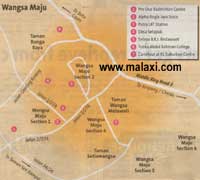 Wangsa Maju Location Map
Wangsa Maju Location Map
Kuala Lumpur | Selangor | Johor | Kedah | Kelantan | Pahang | Perak | Terengganu | Negeri Sembilan | Perlis | Melaka | Pulau Pinang | Putrajaya | Sabah | Sarawak | Labuan

|
|||
| Home > Selangor map > Wangsa Maju map | |||
|
WANGSA MAJU BACK in the early days, Wangsa Maju was part of the Setapak rubber estates, north of Kuala Lumpur. It was considered too far out in the boondocks and thus, the developer probably did not target the high-end market. This provided affordable housing for a number of people in the area: students and staff of Tunku Abdul Rahman College (TARC) and Wardieburn Camp. Today, with new developments,
Wangsa Maju has become one of
the largest suburbs in Kuala Lumpur Wangsa Maju is also noted for the
Alpha Angle, a shopping mall built
amidst low-cost flats, with Jusco as Within Wangsa Maju there is a hill
on the eastern border with Taman
Wangsa Melawati. Relative to the It also faces the Bunus River located to the west. This is a conducive direction for the mall and the effects are apparent. Jusco is still doing very well here.
LRT AND THE ALPHA ANCLE The LRT line could be a concern
as fast-moving trains generate
strong winds which can disperse the Thereafter, the trains come to a
stop at the Wangsa Maju station. In
such a situation, the movement is Environologic factors do not change with this opening of the station: it would be interesting to observe the impact of being "embedded" in the hillside, on the station's performance. Earth energy flows rapidly downhill. The train line may disperse and deflect some of this flow, which slows down the energy movement and may create a pool of energy. UPHILL TASK With the exception of a few houses, homes on Section 27B are
arrayed in a grid that either face The Wardieburn army camp is
located across Jalan Genting Klang.
This is an old base, existing since COLLEGE The college was named after
Malaysia's first prime minister,
Tunku Abdul Rahman Putra aI-Haj,
and was founded by the Malaysian
Chinese Association (MCA). The
college is funded by government
subsidies and governed by a board
of trustees. The majority of students
here are ethnic Chinese due to its UNIVERSITY TARC is best known for its School
of Business Studies and its diploma
level accounting course. It is said The main campus is the largest
college in the city. UTAR's Setapak
campus is also located within the A small mound-like hill can be
found on the grounds of TARC, to
the east of the buildings. A mound is This would suggest a wonderful conducive environment for the success of TARC. TARC would do well to remain on
its present grounds and build further
on its impeccable reputation. Over
time, the college may need to
recharge its energies, especially
when it enters an unfavourable As for each student, they should
ideally orientate their study and
sleeping directions to one that can
help them excel academically. To
determine this direction, each would
need to compute his "Gua" number Taman Bunga Raya, located in a
small pocket surrounded by TARC,
Wardieburn camp and Wangsa Again, due to the layout of the land and rivers (south-flowing Gombak and Bunus rivers), south is generally a better direction, althoug on a mound, even non-south-facing houses will do well.
|
Information Search here
rightmenu

Custom Search
rightbottom |
||
Power By Entertop.net
 Wangsa Maju location map
Wangsa Maju location map